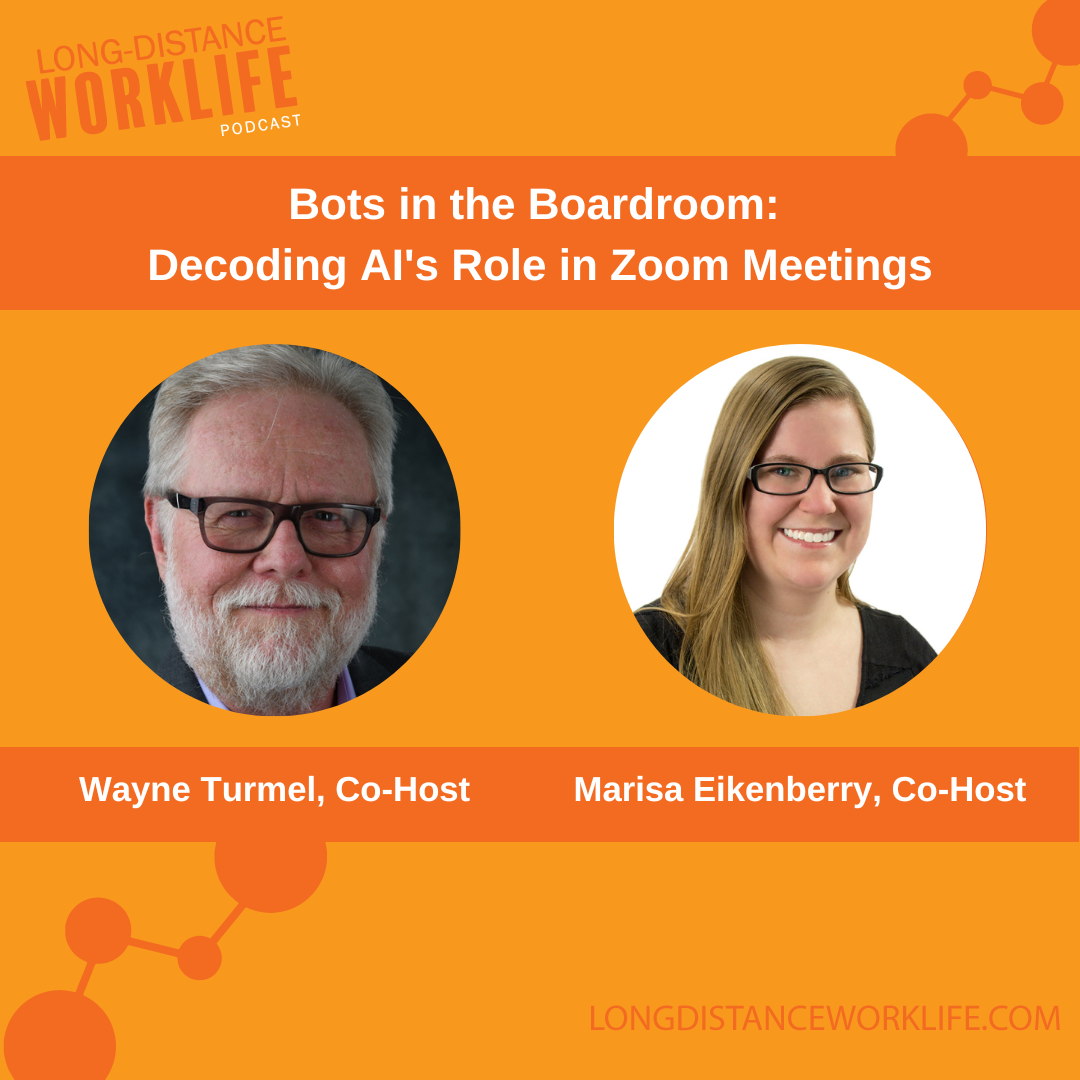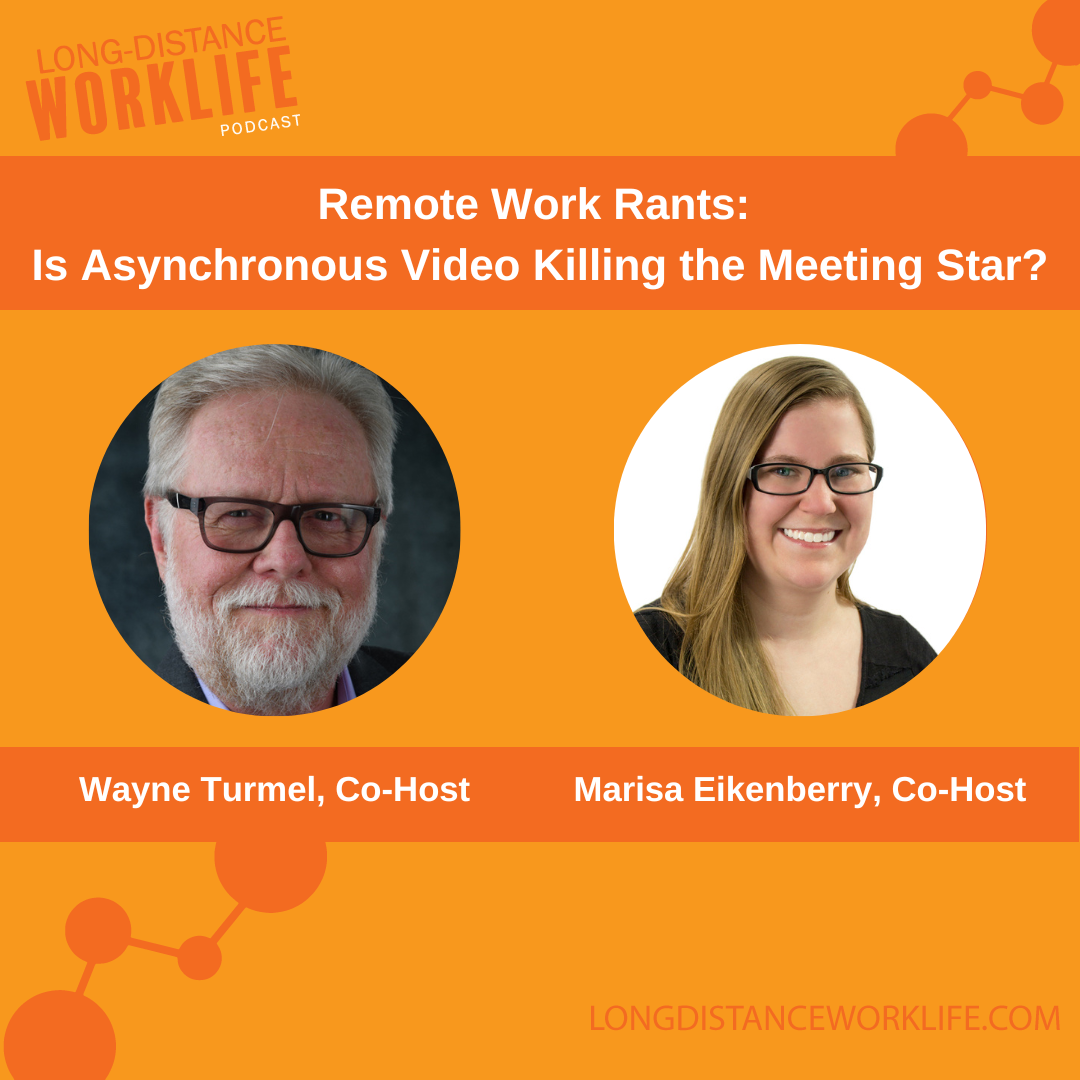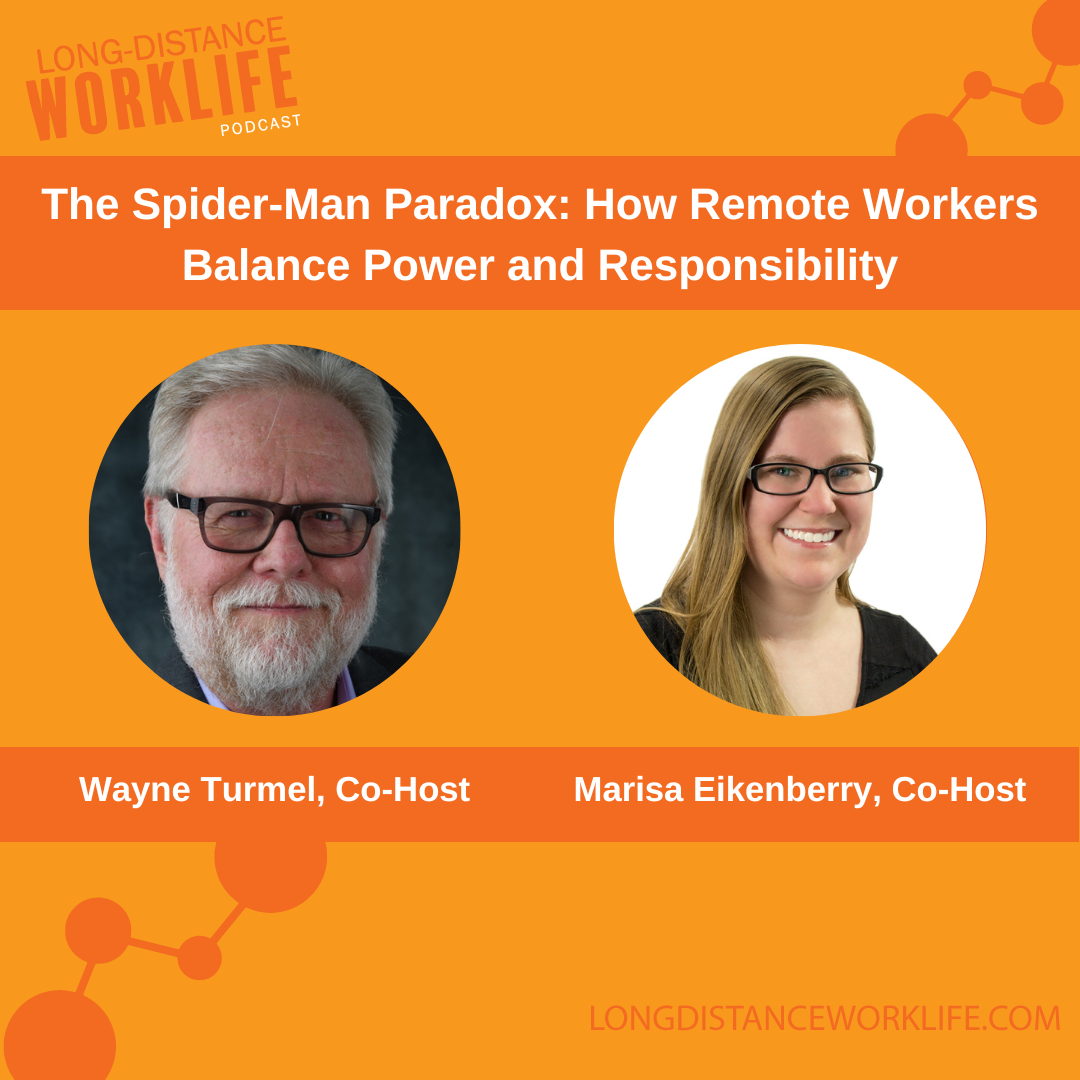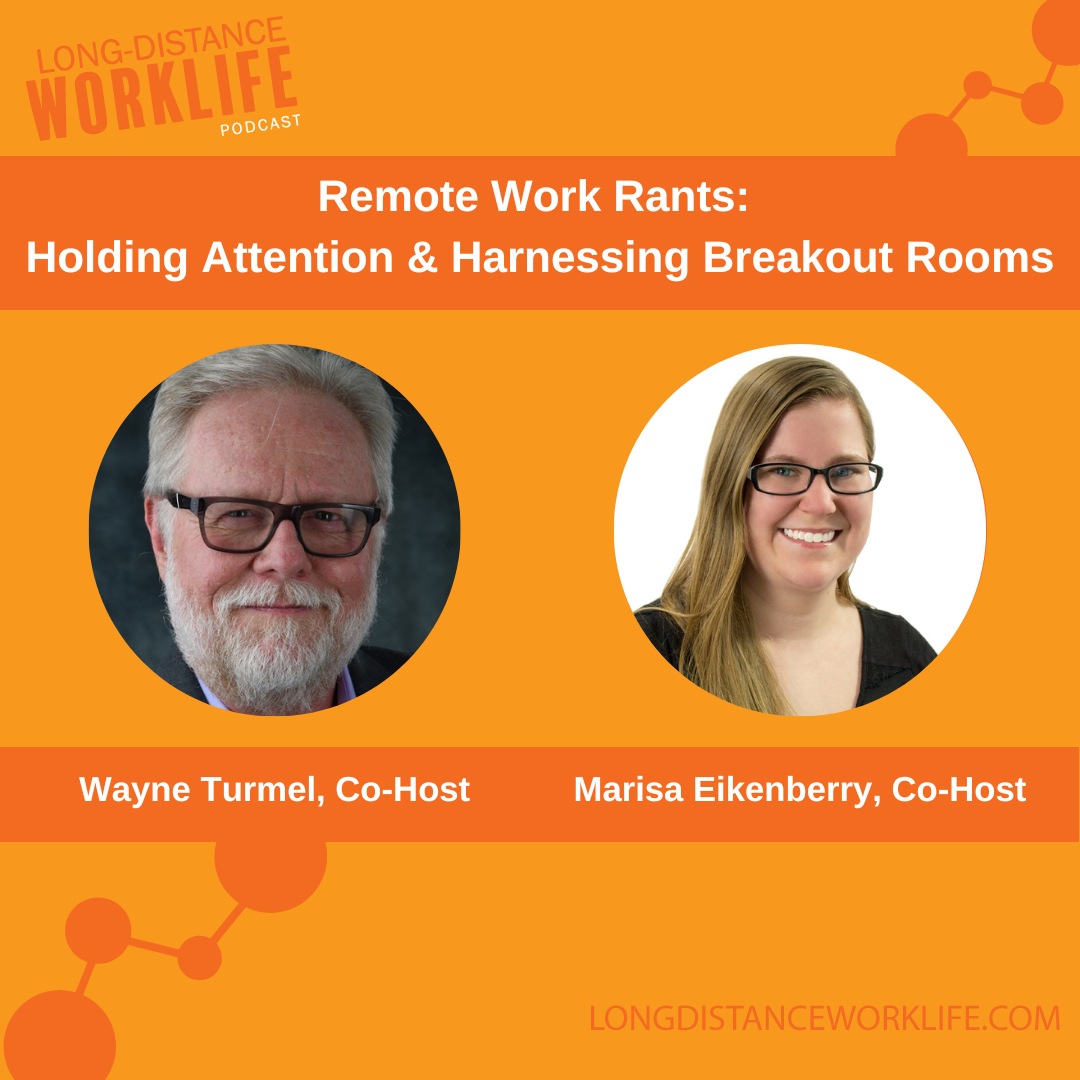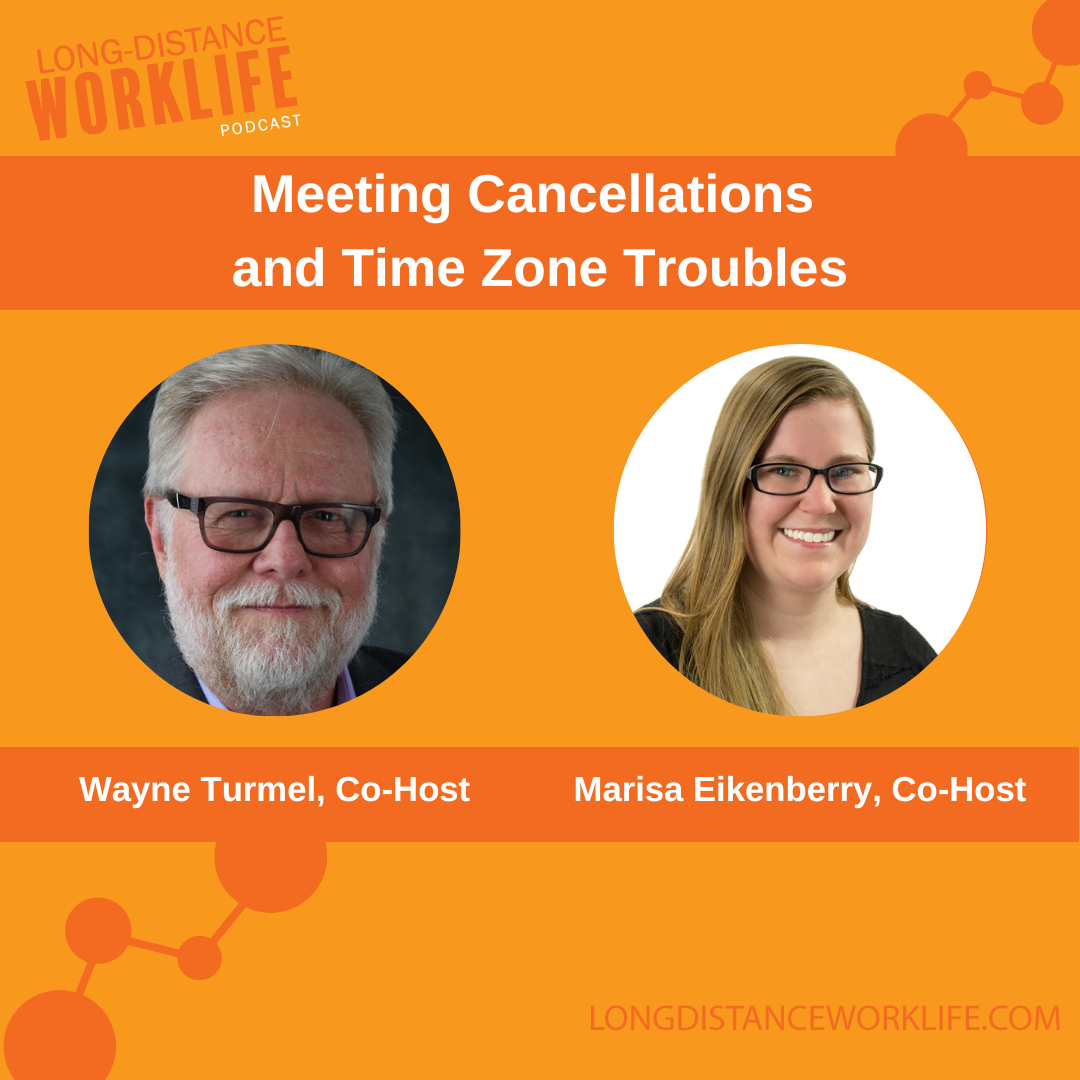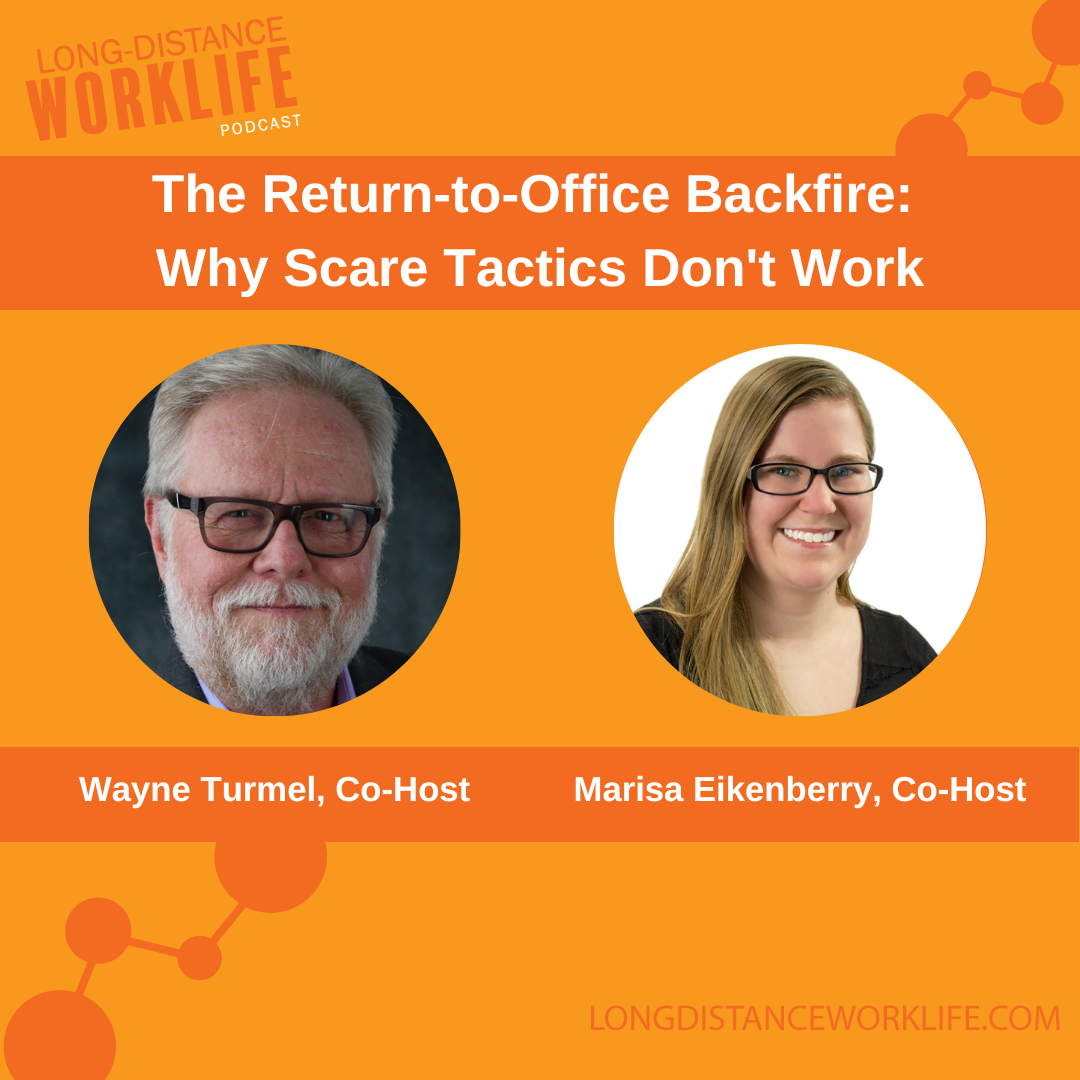Marisa and Wayne discuss the new AI features that Zoom is introducing to its platform. They explore the potential benefits and challenges of using AI in web meeting platforms and highlight the importance of staying informed about new features and tools. They also discuss the potential impact of AI on presentation skills and communication styles, as well as the value of real-time feedback in improving remote meetings.
Key Takeaways
1. AI in web meeting platforms has been evolving for years, with features like live captioning and simultaneous translation becoming more common.
2. Zoom's AI Companion can provide real-time feedback on presentation skills and communication styles, but it's important to use this feedback consciously and ethically.
3. AI Companion can help with research, filling out support tickets, and summarizing meetings, making remote work more efficient and productive.
4. Zoom's AI can analyze meeting participation and help identify individuals who may be monopolizing the conversation.
5. It's crucial to stay informed about new features and tools in web meeting platforms and to adopt those that make sense for your work and goals.
00:00:08:03 - 00:00:19:10
Marisa Eikenberry
Welcome back to the Long-Distance Worklife. Where we help you lead, work and thrive in remote and hybrid teams. I'm Marisa Eikenberry, a fellow remote worker. And joining me is my co-host and remote work expert Wayne Turmel. Hi, Wayne.
00:00:19:12 - 00:00:21:03
Wayne Turmel
Hello. How are you?
00:00:21:05 - 00:00:22:21
Marisa Eikenberry
I'm great. How are you?
00:00:22:23 - 00:00:28:14
Wayne Turmel
I am fine and ready to submit to our robot overlords.
00:00:28:16 - 00:00:49:12
Marisa Eikenberry
So today, listeners, we are actually going to be talking about A.I., which is not a new topic for the show, but it is a new topic for me and Wayne together. And specifically, we're talking about some of Zoom's new A.I. features that they've talked about recently. So I have a link to TechCrunch article about this in our show notes so you can take a look at it.
00:00:49:12 - 00:01:19:03
Marisa Eikenberry
But one of the things that they've talked about is that Zoom is updating and rebranding several of its AI powered features, including the generative A.I. assistant formerly known as Zoom IQ. So it sounds like now it's going to be called the A.I. Companion. And there's lots of different ways that it's going to do stuff. So before we get into the specific things that Zoom AI is about to do, I wanted to talk about this idea of like A.I. in web platforms and web meeting platforms anyway.
00:01:19:05 - 00:01:24:07
Marisa Eikenberry
Like, this might be new for Zoom, but this isn't new for web meeting platforms, right?
00:01:24:09 - 00:01:59:14
Wayne Turmel
It's been coming along for a while. One of the very first things, it probably had been in the background for a while right? When you do this Zoom or WebEx or whatever, automatically does this to compensate. That's been running in the background for a while. One of the first things that kind of caught my eye a couple of years ago is when WebEx was suddenly able to hold a live meeting but caption it simultaneously in three different languages.
00:01:59:16 - 00:02:01:16
Marisa Eikenberry
Which is so wild.
00:02:01:18 - 00:02:31:09
Wayne Turmel
And insane that that is a thing, right, that I can be talking to you. And in the bottom, somebody can follow along in German or whatever. Mm hmm. So that is extremely cool. The challenge. I made the joke earlier about my robot overlords. The problem when we talk about A.I. and this is true, and I know that a lot of people listening to this are already sick of the conversation because it's all anybody's talking about.
00:02:31:09 - 00:02:58:22
Wayne Turmel
Like, all but the way that I look at it is that artificial intelligence is a neutral thing. It just kind of says this is happening, this is something that you can do. It's up to us whether or not we do it. And the part that freaked me out when I saw the article and why I sent the article to you, was it will give you real time feedback on your presentation skills and communication style.
00:02:59:00 - 00:03:02:23
Marisa Eikenberry
Yes, that is the part that kind of caught my eye as well.
00:03:03:01 - 00:03:19:10
Wayne Turmel
Now, as somebody who has spent almost 30 years teaching presentation skills, I know that the first thing that happens when you say to somebody, you know, you say a lot is immediately they say more often.
00:03:19:12 - 00:03:27:17
Marisa Eikenberry
Right. Well, and I know that if it were me, it would be like, slow down. I already know I'm doing the best.
00:03:27:19 - 00:03:44:13
Wayne Turmel
You did not say and you said, slow down. So the feedback that you are get is accurate. In the long run, it's probably helpful. But as I'm running the meeting and up pops a little message that says, make eye contact with the camera.
00:03:44:15 - 00:03:45:22
Marisa Eikenberry
You're right.
00:03:46:00 - 00:04:06:20
Wayne Turmel
It is going to throw me off. And the good news is that these things, as near as we can tell now, I have investigated this a little bit. The key word there is very little bit. These tools need to be turned on. It's not like you're going to start open up WebEx and suddenly it's yelling at you for.
00:04:06:22 - 00:04:25:01
Marisa Eikenberry
Well, on that note, according to TechCrunch and Zoom's website, this has already been added. Well, the Hey I campaign in the you're talking about real time feedback that's going to come in the spring. So at the time that we're recording this, this is September of 2023, so you're not even going to see this until spring of 2024 anyway.
00:04:25:04 - 00:04:33:17
Marisa Eikenberry
But some of these other features are we're going to talk about are already turned on. If you have a paid account, it sounds like it's an opt out, not an opt in.
00:04:33:19 - 00:04:56:06
Wayne Turmel
Okay, Good to know. So time to invest it. Go into your account. Right. And see what the heck has been turned on. And this has been going on for a while. It's like I have been following web presentation platforms for 20 years. And the cycle time for new features has just gotten shorter and shorter and shorter and shorter.
00:04:56:06 - 00:05:03:08
Wayne Turmel
And every time you open up your platform, there's something new or some button has been moved and it's not where it was before.
00:05:03:10 - 00:05:10:01
Marisa Eikenberry
Yeah, and so-and-so has this feature now, so obviously this one has to catch up and Yeah, yeah.
00:05:10:03 - 00:05:34:06
Wayne Turmel
Yeah, there's a lot of that. The thing that we need to remember is every once in a while, stop and find out what's new. And the reason that that matters is they're putting in all these new features and all of this cool stuff. And at the end of the day, it's the same problem. 80% of people use 20% of the features.
00:05:34:11 - 00:05:46:02
Wayne Turmel
So you can have all of these cool problems, but you don't know whether they are cool features or evil features or whatever they are until you actually know they're there and try them.
00:05:46:06 - 00:06:01:09
Marisa Eikenberry
Yeah, thankfully some of these platforms will do notifications and stuff to tell you. I know Slack does that for us. It'll tell us that there's new features and then I go look them up. But for those people who are using platforms that don't do that, you know, periodically, look yeah.
00:06:01:09 - 00:06:28:20
Wayne Turmel
And it does matter. I mean, the whole point of using these tools, I know that most of us do the bare minimum because we're getting our job done and we're not techies and we don't enjoy playing and poking around and seeing what they do. But we have to remember the purpose of these tools. All appearances to the contrary, the purposes of these tools are to make us better.
00:06:28:21 - 00:06:51:13
Wayne Turmel
They invented these things so that we could do something better, faster, smarter than we did it before. Yeah, if you blithely ignore that A you're doing your job as slowly and badly and efficiently as you always have and not taking advantage of the opportunity to improve. But everybody else is right.
00:06:51:13 - 00:07:23:11
Marisa Eikenberry
I know that there's been a huge conversation about AI in general and you have some people that are just like, That's stupid. I'm going to ignore it. I'm not going to pay attention at all. And like, I'm not saying that you need to figure out AI and every piece of your job. Like, no, like, absolutely not. But people who are completely ignoring AI are going to be behind the people who have figured out how to make it work in their job or figured out how to utilize it in their business and doing things faster, better, smarter than those that aren't touching it at all.
00:07:23:14 - 00:07:36:20
Wayne Turmel
Yeah, and it's it's a it's an issue because there are things AI is behavior neutral. It is neither good nor bad. It is just a thing. That's what I have to keep telling myself. Yeah.
00:07:36:22 - 00:07:39:05
Marisa Eikenberry
Yeah. It is only as good as whatever you put in it.
00:07:39:06 - 00:07:53:14
Wayne Turmel
Right. For example, and I can't remember if I've told this story before when Kevin insisted that I get a chatty account and start playing with it, the first thing I did was I said, Give me a bio of author Wayne Turmel, and I.
00:07:53:14 - 00:07:54:21
Marisa Eikenberry
Did this for you too.
00:07:54:23 - 00:08:07:17
Wayne Turmel
He gave me two paragraphs. Great stuff, well-written, concise. It also gave me a degree. I do not possess and credited me with a book I did not write.
00:08:07:19 - 00:08:19:15
Marisa Eikenberry
That happened to me when I put in my own name just to be like, What is it because I'm so intertwined with you? With this podcast? It had your credentials as mine, which I was like, It's very flattering.
00:08:19:20 - 00:08:48:04
Wayne Turmel
And hey, listen, bask in the past in the radiated glow and know you are welcome to whatever humble bits of glory I can share with you. But here's the thing. It took me 30 seconds to fix the problem, and suddenly I had a really good buy that I, by the way, have copied and pasted and used.
00:08:48:06 - 00:08:59:12
Marisa Eikenberry
Right. I use A.I. to help out with podcast features. Sometimes finding things like timestamps of our main points and things like that. Like there are good reasons to use A.I..
00:08:59:13 - 00:09:18:16
Wayne Turmel
So let's get specific to what some of the things that this is not. And I got no so of course qualified to have the, you know, do we need to worship our robots? Overlord overlords discussion but it's there's some stuff here that we need to think about, right?
00:09:18:21 - 00:09:33:03
Marisa Eikenberry
So I mean, like we talked about already, you know that the AI campaign is going be able to give real time feedback on how fast and how often you're talking versus listening so you can adjust in the moment. That's a quote straight from the Zoom blog. But some of the other things that I think are kind of interesting.
00:09:33:05 - 00:09:35:13
Wayne Turmel
Right now, the AI saying Marisa Brie, you.
00:09:35:18 - 00:09:56:09
Marisa Eikenberry
Know, which. Okay, actually, before we get on to that, like all I can think too, is some of these features and we'll talk about more of them here in a minute. To me, it feels like it's adding an extra distraction when we're already having an issue, keeping people's attention and engagement in meetings. What are your thoughts on that?
00:09:56:11 - 00:10:08:04
Wayne Turmel
Oh, yes. And okay. Yes, that's absolutely like I said, as a presentation skills coach, the minute I say look at your audience, people's brains freak out.
00:10:08:06 - 00:10:09:14
Marisa Eikenberry
Yeah.
00:10:09:16 - 00:10:36:03
Wayne Turmel
Because they have to consciously do something that they have been doing unconsciously. And the minute you do that, it's uncomfortable and weird. So that feedback in real time, if I'm expecting it, if I've said, Hey, you know, let me know if I'm speaking too quickly and it says you're speaking too quickly, that's valuable feedback to me. I'm expecting it.
00:10:36:05 - 00:10:43:06
Wayne Turmel
I'm looking for it. I am using that to achieve a goal. This is now useful information.
00:10:43:08 - 00:10:45:14
Marisa Eikenberry
Mm hmm. That makes sense.
00:10:45:16 - 00:11:16:01
Wayne Turmel
Right? So it's also really good where I expect this is going to be super helpful. It's forensically okay. And I don't mean cutting open bodies. I mean, after the meeting, you can ask it to analyze your presentation. You can ask it to analyze your mean who spoke the most on the meeting and how much did they contribute. And we find out that Bob is just monopolizing the meeting and we have the efforts.
00:11:16:03 - 00:11:20:03
Marisa Eikenberry
Yeah. Now, it's no longer our word against Bob's.
00:11:20:05 - 00:11:52:21
Wayne Turmel
So I can see where and this caveat goes with everything involving A.I.. If you're conscious of what you are going to use the information for and you are ethical about how you use that information, it will be incredibly helpful. It's like the simultaneous translation stuff. How can that not be Google Friend? We have automatic transcribe option that is happening.
00:11:52:22 - 00:12:14:17
Wayne Turmel
I can take and they've had the app for a while where I can take notes which basically what it does is somebody talks for a period of time and then they summarize, right? So if I'm speaking on the meeting, there's going to be a big chunk of information there. But and then Marisa asked this.
00:12:14:19 - 00:12:16:11
Marisa Eikenberry
Right?
00:12:16:13 - 00:12:48:17
Wayne Turmel
That's useful. That's really helpful information. So, you know, this stuff is like I say, you have to understand why they're giving you. What are you supposed to do with the information? Because it it's easy to just get completely overloaded by all of the feedback that you're getting. I mean, one thing is, as a human being, if I'm giving you feedback on your presentation skills, I'd stick there.
00:12:48:17 - 00:12:50:05
Marisa Eikenberry
Yeah.
00:12:50:06 - 00:12:54:16
Wayne Turmel
If I said everything that you were doing wrong.
00:12:54:18 - 00:12:55:15
Marisa Eikenberry
Yes.
00:12:55:17 - 00:13:16:18
Wayne Turmel
Or that you could do better, you're I would roll up in the back of your head and your head would explode. And you wouldn't hate me forever. Right? I pick my shots if somebody is an experienced presenter. Mm hmm. I will give them very specific, like concrete, perhaps techie advice.
00:13:16:20 - 00:13:18:13
Marisa Eikenberry
Right.
00:13:18:15 - 00:13:52:13
Wayne Turmel
Because they're already working at a certain competence level and they want to get better and improve, but they're going to improve incrementally if somebody it's just awful. If somebody can barely put two words together and there are people like that and I've worked with them my entire career, if I can just get them to breathe and look at the camera, that's the way I'm going to coach them differently and give them different feedback than somebody who is super competent and trying to.
00:13:52:15 - 00:13:53:19
Marisa Eikenberry
Yeah, get to the next level.
00:13:54:00 - 00:13:58:07
Wayne Turmel
Get to the next level. I can make that decision.
00:13:58:09 - 00:14:00:16
Marisa Eikenberry
Right? I cannot.
00:14:00:17 - 00:14:17:04
Wayne Turmel
Right. And I cannot or at least doesn't. Yeah, Yeah. So if, you know, Bob gets feedback from the A.I. and it says, Yeah, you could slow down a little. And then Mary gets feedback from the A.I. that says page 105 and it's you.
00:14:17:06 - 00:14:17:14
Marisa Eikenberry
Mary.
00:14:17:14 - 00:14:22:22
Wayne Turmel
My list of stuff you're going to destroy Mary. And that's not the intent.
00:14:23:01 - 00:14:46:11
Marisa Eikenberry
All right. Well, and so, I mean, I know that we've talked a lot about what it will be like for presentation skills, but one of the other things that it also talks about is real time feedback on people's presence in meetings. Now, to me, I take that as, you know, they're going to zoom is going to tell, you know, my boss, whomever is running the meeting, if I look over at my screen next to me.
00:14:46:15 - 00:14:59:11
Marisa Eikenberry
But what the AI doesn't know is I'm looking over at my screen and I'm typing something because, you know, Kevin just asked a question and I'm going to find out what the answer is without interrupting the meeting. But I don't know that.
00:14:59:13 - 00:15:40:01
Wayne Turmel
This is a supercharged version of something that the original web platform tools used using guide and got away from because they got used for evil more than good early days, WebEx and the stuff that Microsoft started with and all the dozens of tools that no longer exist, they have a thing. They still have it called the attention meter, where you can tell whether the screen that somebody has open is your meeting or if they've minimized it or open another screen in front of it.
00:15:40:03 - 00:15:41:05
Marisa Eikenberry
Right.
00:15:41:07 - 00:16:12:06
Wayne Turmel
And as with all things that got horribly abused, people would say, don't you dare open a screen when I'm talking to you or you know, darn it, Marisa, come back. You know, I can see that you're not paying attention. Well, that's evil and stupid and largely untrue. So why are you using the tools now when I get that feedback that maybe people maybe it's time for a break?
00:16:12:08 - 00:16:13:07
Marisa Eikenberry
Yeah.
00:16:13:09 - 00:16:25:20
Wayne Turmel
Maybe I should give them a compelling reason to actually pay attention. There's a wacky notion. I look at that as feedback for me as the presenter as much as anything else.
00:16:25:22 - 00:16:30:12
Marisa Eikenberry
And I can see that being a really good reason to use that kind of software for sure.
00:16:30:14 - 00:16:41:08
Wayne Turmel
And so again, to say we're going to give you feedback, then tell me what I'm supposed to do with it.
00:16:41:10 - 00:17:04:23
Marisa Eikenberry
Yeah, I know that we're still very much in the early days. They just announced this very recently, but I'm I'm going to be very interested to see that piece of things when it comes out in the spring. But one of the other things that I think is already enabled now is during a meeting you're going to be able to ask to a companion to help you research critical information, help fill out support tickets.
00:17:04:23 - 00:17:22:02
Marisa Eikenberry
So that way, to your point, we don't have to open up another window. We can be more engaged in the meeting, which is fair. But the other thing that I find fascinating with this companion is that if you're late to a meeting, you can ask the companion questions about what you've missed.
00:17:22:04 - 00:17:27:12
Wayne Turmel
And again, this gets back to the trend. You know, this is transcription on steroids, right?
00:17:27:13 - 00:17:28:09
Marisa Eikenberry
Right.
00:17:28:11 - 00:17:37:06
Wayne Turmel
I mean, how many times have you gotten to a meeting late and you turn to the person next? You can go, What did I miss? And they say this, this and this, and now you're caught.
00:17:37:08 - 00:17:43:16
Marisa Eikenberry
Yeah, yeah. Or you heard something, but you didn't pay attention for a second and you got to figure out what they just said.
00:17:43:16 - 00:17:56:19
Wayne Turmel
I don't have them or instance sitting next to me that I can lean over and whisper. Right. I've got whatever horrible Anglo-Saxon name they're going to give the guy all over.
00:17:56:21 - 00:17:59:14
Marisa Eikenberry
He's just a I companion, so it may not have a name.
00:17:59:16 - 00:18:03:07
Wayne Turmel
Oh, we're humans. We will name, you know we will.
00:18:03:10 - 00:18:25:09
Marisa Eikenberry
Oh, I'm sure. I'm sure. So I do find that part really fascinating. And just this idea that, like, you can ask questions during the meeting without necessarily interrupting the meeting to ask a question. So that could be very helpful and very fascinating. And the other thing is that when the meeting is over, it will actually like we've already talked about, you know, it's summarizing as we're going.
00:18:25:09 - 00:18:52:18
Marisa Eikenberry
So it'll provide a summary after the meeting. It will also do what they're calling smart clips and so little pieces of the meeting about different subjects that you don't have to rewatch the entire meeting. You can just get that section about that particular topic. I know that sometimes AI is not always great about clipping, so I'll kind of be interested to see how it clips things because it tends to cut off things that should have been in a section.
00:18:52:20 - 00:19:00:03
Wayne Turmel
But we also know that a good percentage of the people listening to us right now came to us because I took some clips.
00:19:00:07 - 00:19:01:00
Marisa Eikenberry
That's true is.
00:19:01:01 - 00:19:26:11
Wayne Turmel
Goes and they said, Oh, that sounds really interesting. So we already know that this happens, but it's also and we're out of time for the other stuff. But I just let me wrap this up. Yeah. It's also one of the things that happens right now is if somebody can't make the meeting, Kevin records the meeting.
00:19:26:13 - 00:19:27:06
Marisa Eikenberry
Mm hmm.
00:19:27:08 - 00:20:00:02
Wayne Turmel
Well, a couple of things. First of all, a lot of organizations, their i.t department won't let them do that because of bandwidth and network problems. Right? And we don't want people recording stuff that shouldn't be recording, in fact, kinds of things. So that's not going to work. But even if they do record it, you really want to sit through an hour in the first 20 minutes as status reports and stuff you don't care about to find the piece of the meeting that you actually do want to hear.
00:20:00:07 - 00:20:01:07
Marisa Eikenberry
Mm hmm.
00:20:01:09 - 00:20:17:10
Wayne Turmel
I can help you do that. And you can actually say, you know what? We're not going to include the status report, so let's get right to the discussion on X. That's kind of cool. Yeah. And that's an actual productivity tool.
00:20:17:12 - 00:20:37:12
Marisa Eikenberry
Yeah, they could actually be really helpful. I know it'll also add like action items and here's who to email and all that kind of stuff. So it's going to be very interesting to see how this continues to play out and if any of you have access to some of these tools and are testing these out, let us know because I want to see how this works.
00:20:37:13 - 00:20:49:07
Wayne Turmel
Well, and I promise that I will be doing some more research on this. The important thing is that we are they're not going to be making fewer tools.
00:20:49:09 - 00:20:50:15
Marisa Eikenberry
Right.
00:20:50:17 - 00:20:51:08
Wayne Turmel
Away.
00:20:51:10 - 00:20:52:07
Marisa Eikenberry
There will always be a.
00:20:52:07 - 00:21:19:12
Wayne Turmel
Duty to happen. And every idea, no matter how harebrained, started with somebody trying to solve a problem, whether it does it effectively or not, is a open question. But these things were created for a reason, and so they are worth investigating and we need to adapt, adopt the things that make sense to adopt. We need to figure out what we want.
00:21:19:12 - 00:21:33:02
Wayne Turmel
Our machine overlords to help us with and what we don't need. And we need to maintain our critical faculties to not take everything that comes at us as gospel.
00:21:33:04 - 00:21:36:07
Marisa Eikenberry
Absolutely. I get things wrong all the time.
00:21:36:07 - 00:22:03:20
Wayne Turmel
Well, it's not even that A.I. gets things wrong. It can't create content. It can't tailor information to individual humans. It can't tell the difference between a joke and a statement, which, if it's analyzing me, is going to cause problems. Yes. So there will be much more about this. Thank you for joining us, Marisa. Bring us home.
00:22:03:20 - 00:22:21:23
Marisa Eikenberry
Thank you so much for talking to us about this. I have no doubt that this will be one of many A.I. conversations as we go. And like I said, any of you listeners that have questions about this, topics that you want us to cover in this, please let us know. And thank you for listening to the long distance work life for Shownotes Transcripts and other resources.
00:22:21:23 - 00:22:41:22
Marisa Eikenberry
Make sure to visit longdistanceworklife.com if you haven't yet, subscribe to the show so you don't miss any future episodes. And while you're there, be sure to like and review. This helps us know what you love about our show. Feel free to contact us via email or LinkedIn with the links in our show notes. Let us know that you listen to this episode or even suggest a topic for Wayne and I to tackle in a future episode.
00:22:42:01 - 00:22:55:19
Marisa Eikenberry
We'd love to hear from you. And if you'd like to learn more about remote teams, order Wayne and Kevin Eikenberry's new book, The Long Distance Team, you can learn more about the book at Long Distance team book Dot.com. Thanks for joining us. As Wayne likes to say, don’t let the weasels get you down.
Timestamps
00:00 Introduction
00:49 Zoom's new AI features
01:19 AI in web meeting platforms isn't new
02:31 AI Companion provides real-time feedback on presentation skills
04:06 Importance of staying updated on platform features
06:01 Benefits of utilizing AI in job or business
07:23 AI is behavior neutral
08:07 Personal experiences with AI inaccuracies
08:48 Practical uses of AI
09:18 Considerations and discussion on AI usage
09:33 Discussion on the potential distractions of AI in meetings
10:08 Importance of conscious use and ethical considerations of AI feedback
11:16 AI's forensic analysis of presentations and meeting contributions
14:46 Real-time feedback on presence in meetings and potential misuse
16:12 Feedback on attention as a tool for presenter improvement
17:04 AI companion's role in research and catching up in meetings
18:25 Summarize and provide smart clips after meetings
20:37 Request for feedback from listeners testing AI tools
21:19 Importance of critically evaluating AI tools and information
22:21 Conclusion
Related Episodes
- Keeping Teams Engaged in the Digital Age with Vivek Nigam
- Solving the Challenges of Hybrid Teams with AI Technology with Projjal (PJ) Ghatak
- Remote Work Rants: Should You Turn Your Camera On for Every Meeting?
- Do Virtual Meetings Kill Creativity with Elise Keith
- Do We Really Need More Webmeeting Tools? with Hoyin Cheung
Additional Resources
- Zoom rebrands existing — and intros new — generative AI features | TechCrunch
- Meet Zoom AI Companion, your new AI assistant! | Zoom Blog
- Learn more about Wayne Turmel
- Email Wayne Turmel
- Connect with Wayne Turmel on LinkedIn
- Learn more about Marisa Eikenberry
- Email Marisa Eikenberry
- Connect with Marisa Eikenberry on LinkedIn
- Purchase a copy of The Long-Distance Leader
- Purchase a copy of The Long-Distance Teammate
- Purchase a copy of The Long-Distance Team
- The Kevin Eikenberry Group
Order The Long-Distance Team
Remote leadership experts, Kevin Eikenberry and Wayne Turmel, help leaders navigate the new world of remote and hybrid teams to design the culture they desire for their teams and organizations in their new book!


